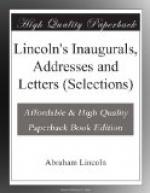Such a decision is all that slavery now lacks of being alike lawful in all the States. Welcome, or unwelcome, such decision is probably coming, and will soon be upon us, unless the power of the present political dynasty shall be met and overthrown. We shall lie down pleasantly dreaming that the people of Missouri are on the verge of making their State free, and we shall awake to the reality instead that the Supreme Court has made Illinois a slave State. To meet and overthrow the power of that dynasty is the work now before all those who would prevent that consummation. That is what we have to do. How can we best do it?
There are those who denounce us openly to their own friends, and yet whisper us softly that Senator Douglas is the aptest instrument there is with which to effect that object. They wish us to infer all from the fact that he now has a little quarrel with the present head of the dynasty; and that he has regularly voted with us on a single point, upon which he and we have never differed. They remind us that he is a great man, and that the largest of us are very small ones. Let this be granted. But “a living dog is better than a dead lion.” Judge Douglas, if not a dead lion for this work, is at least a caged and toothless one. How can he oppose the advances of slavery? He don’t care anything about it. His avowed mission is impressing the “public heart” to care nothing about it. A leading Douglas Democratic newspaper thinks Douglas’s superior talent will be needed to resist the revival of the African slave-trade. Does Douglas believe an effort to revive that trade is approaching? He has not said so. Does he really think so? But if it is, how can he resist it? For years he has labored to prove it a sacred right of white men to take negro slaves into the new Territories. Can he possibly show that it is less a sacred right to buy them where they can be bought cheapest? And unquestionably they can be bought cheaper in Africa than in Virginia. He has done all in his power to reduce the whole question of slavery to one of a mere right of property; and, as such, how can he oppose the foreign slave-trade—how can he refuse that trade in that “property” shall be “perfectly free”—unless he does it as a protection to the home production? And as the home producers will probably not ask the protection, he will be wholly without a ground of opposition.




